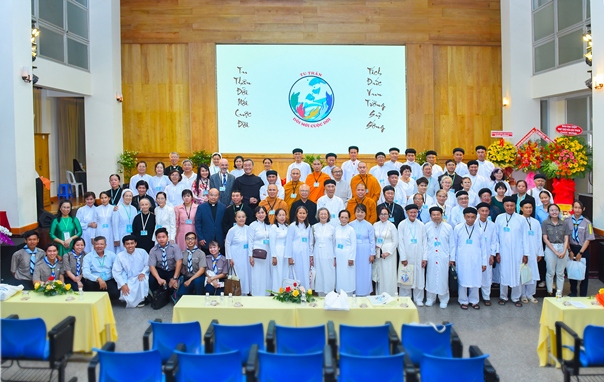The 12th Interfaith Encounter in Saigon (27.10.2022)

In the spirit of Nguyên Dinh Chiêu, the organizing committee proposed to the participants of the 12th Interreligious Encounter to discover the different paths of Tu Thân in the main religions present (Buddhism, Cao Dai, and Catholicism). Several speakers explained the conception of Tu Thân in their respective religious traditions. Originally, Tu Thân is one of the fundamental elements of humanization according to the Confucian conception; it is an itinerary of moral and spiritual progress based on a method of self-observation and inner conversion.
In the opening speech of the Interfaith Encounter, Bishop Pierre Nguyen Van Kham, Chairman of the Religious Life Commission of the Vietnamese Episcopal Conference, recalled that Tu Thân is the heart of every religion because despite their differences, all religions welcome Tu Thân as a path of growth for each person in truth, goodness, and grace; it allows those who practice it to approach the Truth-Compassion-Beauty. When religions help their followers to practice Tu Thân, they contribute to building a healthier, more human, and more pleasant society.
Then, representatives of Cao Dai (Priest Hong Mai - General Department of Dai Dao Doctrine), Buddhism (Venerable Thich Minh Liem - Lecturer of the Buddhist Academy of Vietnam), and Catholicism (Father Pierre Nguyen Van Hien - Director of TTMV Saigon) presented the teachings and practices concerning Tu Thân according to each religion. As a result, participants were able to discover and deepen different aspects of Tu Thân as well as draw lessons for their practice of Tu Thân.
Presentations and sharing alternated with musical performances and meeting times. Indeed, the Interfaith Encounter is not only an opportunity to discover and deepen elements of other religions, but also an opportunity to appreciate significant artistic works and especially to meet and exchange with participants of other religions present.
Before the closing ceremony, the representatives of the religions prayed for the national and local leaders, for the religious leaders, for the peace in the world, and in particular the peace between Ukraine and Russia. Finally, the 12th Interfaith Encounter ended with the Prayer for Peace in a warm, fraternal, and fervent atmosphere, a prayer for the world and Vietnam.
I have been participating in the Saigon interfaith meetings for four years. This last meeting has left me with many strong impressions and profound lessons; it has helped me to reflect on myself. In Vietnam, for some time now, Catholics as well as members of other religions have been making many efforts to get closer to each other, to express kindness, respect, and harmony, and to avoid jealousy and misunderstanding. However, we must recognize that the results are weak and that there is still a significant gap between religions. If Tu Thân is deeply rooted in the heart and everyone practices it with courage and fervor, then I believe that solidarity and brotherhood will progress and transcend ethnic, religious, social, and economic boundaries. It will help people to approach the sublime reality of "Truth-Compassion-Beauty" in daily life, where similarities and differences are arranged in a harmonious complementarity.
Finally, with "the dispositions that are in Christ Jesus himself" (Phil 2, 5), as Oblate Sister of the Assumption, I live the Tu Thân by cultivating myself and returning to my inner reality. I seek to open up and focus on a greater reality - union with God, with others, and with myself. I live this simply in my personal life, in my religious community, and in my commitment to respond to the needs of today's society and of the Church, as a witness to the Gospel and the joy of the Kingdom.
Sr. Marie-Micaelle HOÀNG Phương Thúy (OA)

